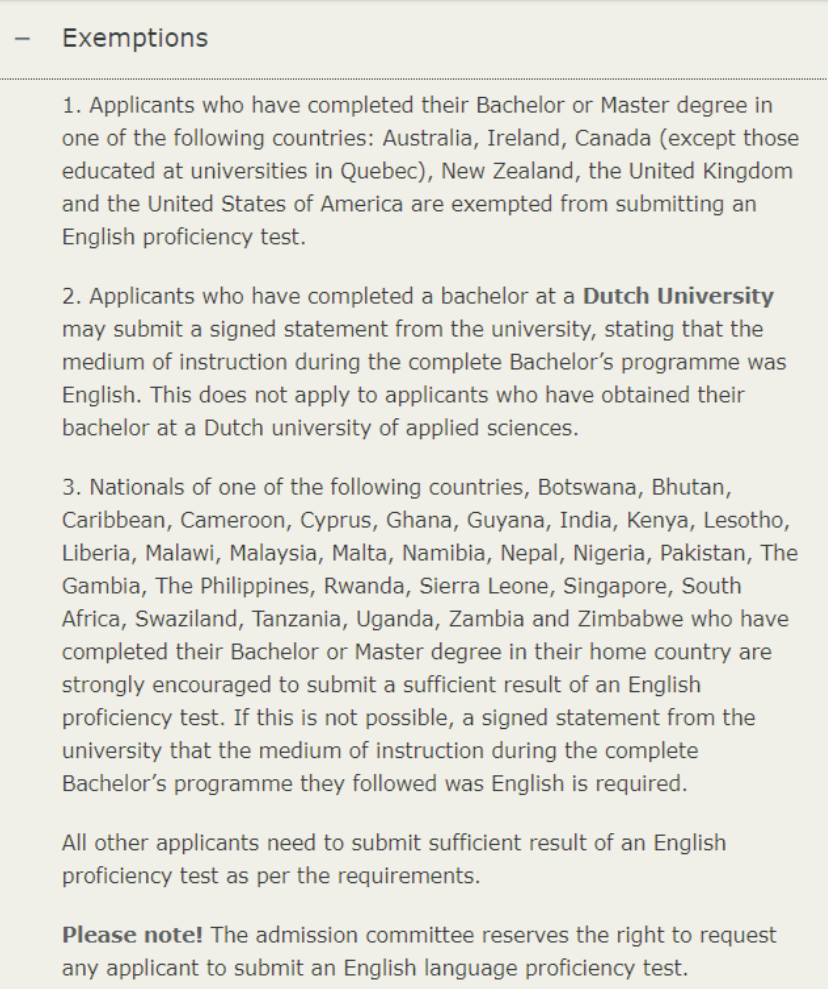On how WUR has changed its admission policy regarding English requirements and how the Netherlands called for a halt on foreign student recruitment, pinning internationals as a key part of their problems.
The Education and Examinations Regulations (EER) is the kind of document that concerns us all as students but almost no one pays attention to it or even knows about its existence. The EER includes, among other things, the registration procedure, the examination material, the structure of the programmes, and the focus of this article: the criteria you need to fulfil for admission into your programme.
The big change in the Education and Examinations Regulations
From year to year, the EER has some relevant adjustments. In the 2020-2021 EER, the possibility of exemption from presenting an English proficiency test was possible if your country was on the exemption list that was referred to on a page of WU’s website as shown below (2020 – 2021 EER – Appendix 3 point 2.2). Students from these countries were exempted from presenting an English test, which at first glance, seems reasonable since all these countries have English as an official language. If your country was not on the exemption list, you would have to prove your English knowledge by taking one of the renowned standardised tests TOEFL, IELTS, or Cambridge, and get a score equivalent to 6.0 (B1/B2) and above in the IELTS, or higher for certain programmes (7.0 – B2/C1). These tests are expensive, with a cost of around 200 USD and are paid in that currency, becoming a barrier for many in their aspirations for studying abroad. Besides the high cost and effort these tests demand, the dubiousness of these, as other standardised examinations, stands. Among other issues, people prepare to hack these tests without having any formal education in English, while others, having sufficient knowledge of the language, fail due to external and internal factors that came into play on the day of the test.
But two years ago, the English requirements were changed for MSc. admissions. In the 2022-2023 EER, only Singapore and South Africa remained on the list, next to the UK, Ireland, the USA, and Canada excluding universities from Quebec but including McGill University, Australia, and New Zealand. All other countries are required to present an English proficiency test.

Why did this cut-off at the most Herod the Great style take place? According to policymakers of the Corporate and Legal Services department and the Executive Board, all revisions of the EER are to safeguard the academic excellence of WUR. Fair enough, but why this precise change? Why exclude all African countries except for South Africa? Is it because most (if not all) South African students at WUR are white with some European heritage? That must not be the reason, but it can be interpreted as such (I just did). Before accusing WUR of being systematically racist, a year ago while I was part of the Student Council, together with my colleague from Ghana, we decided to figure out the reasoning behind these changes.
Finding out why
It took a while for a meeting about it to take place. Finally, via our trusty friend teams, some members of the Student Council, the person in charge of the EER, the person in charge of the admission language requirements, and the admission numbers person from the Student Service Centre (SSC), gathered digitally to discuss these changes. During the meeting, a PowerPoint was presented with an extensive explanation of why the list of exemptions was changed. I’ve considered each of the five justifications they gave in that meeting for quite a long time and most of them still baffle me to this day.
The first reason given was that WU has an admission instead of a selection system. Selection would involve choosing from those who meet the admission criteria while admission admits everyone who meets it. In this sense, they intended to demonstrate how WUR is very welcoming and that is very important having clear criteria since it is the only filter, and all applications need to be processed. Yet, this has been the case for a long time, so it only justifies the change of exempt countries if you look at it from the administrative burden.
Second, they explained how the Dutch Organisation for the Internationalisation of Education (known as Nuffic) advises to not have a ‘statement countries’ list that guarantees sufficient English. This is just advice and not strictly necessary to follow, and again, this advice has been there since before, so even if it supports the decision to remove the exemption list as it was, it does not justify the recent change.
Third, the policymakers shared that WUR, like almost all higher education institutions, committed itself to the Code of Conduct. This document sets the standards for how universities deal with international students. Only by signing is the recruitment of international students possible. The Code of Conduct defines a minimum level of English to fulfil (IELTS > 6.0 points, B1/B2), allows exemptions if the previous education was in English (if the diploma has sufficient value according to Nuffic), and allows each university to apply methods in how to evaluate these requirements. WUR was already aligned with the Code of Conduct, so it is not a justification.
Fourth and slightly more significant, they presented how WUR had made an internal investigation to evaluate the countries on the list, and the change itself. The investigation showed that the list of countries lacked cohesion in their English proficiency index, their education system levels according to Nuffic, their colonial past and their GDP. In other words, basically and unsurprisingly, countries are different from each other. Concluding that only Singapore and South Africa could be exempted from the English certificate test due to their language proficiency level and the quality of their universities. Finally, one of the more telling reasons for me, was when they explained that Dutch universities do not compete but try to work together by having similar standards and methods of admission. Since Wageningen was the only university with a list of countries for language exemption, it “had” to adjust according to its counterparts. ‘Had’ in quotation marks because there was no formal obligation, just peer pressure. While the previous bullet points were mere sophisms, this seems to be the main reason for the change. WUR was bullied and co-opted.
A year after the exemption list was drastically reduced, the Executive Board decided to harmonize the English-level requirements for all programmes to B2/C1 level instead of some B1/B2 and others B2/C1. This policy change will take place for the next academic year EER so that it can take effect as of the academic year 2024-2025. Although it is important to mention this motion was started by the Student Council in 2018 and it will take place despite the advice given by the Admission Policy Committee set to investigate if it was necessary to harmonize, which concluded that it was not necessary to do it. Again, an argument given for this change was that other universities require such a level. Why do we have to follow other universities?
Whatever the reason, the implication of this change is felt by part of our university. According to WUR’s numbers, the students from African countries previously on the exemption list that applied for an English test exemption is four times the number who didn’t, while the number of students from Asian countries that presented a test is five times greater than the number who didn’t. The policymakers were aware of the consequences this change could have on the university – namely diminishing the already small African student population – but in the name of safeguarding ‘academic excellence’, the change proceeded without significant resistance.
According to WUR data, last year Wageningen received 2085 fewer MSc applications from Ghana and Nigeria, which ultimately resulted in a decrease of 2 students who registered. Simultaneously, programmes like Organic Agriculture are already explicitly experiencing a lack of African students and concern about the diversity of the student population. These consequences are not surprising, given the high cost and foreign payment the English certificate test entails, and that a big part of the African student population studying in Wageningen receives scholarships after their admission. Even though according to the university’s data the total student population hasn’t been affected by the policy change (yet), it is important to ask what message is WUR giving to its community and sending to the world, how these decisions relate to its colonial past and the paradigm of the world.
The role of systemic racism
All this is taking place at the WUR level while at the national level, the minister of education in the last months called to halt the active recruitment of foreign students by all higher education institutions in the country, arguing that the international influx is jeopardizing the housing market and the workload of teachers; blaming indirectly these students as if they were taking all the spare houses co-nationals need, and causing the deficit in funding that education has been experiencing in the last years. Coming from Mexico, I cannot help but compare this line of thought to Donald Trump’s argument that Latin immigrants were taking American jobs in an already broken labour market. The housing market in the Netherlands is having a stroke and this measurement is just a chauvinistic paracetamol for it. While the education system has been in a funding deficit at least since 2018 according to a PriceWaterhouseCoopers study with an estimated need of 800 million euros extra a year to compensate.
What do these shifts in WUR and the Netherlands’ attitudes toward international students tell us about the Dutch context? Both WUR and Netherlands’ decisions are (in)directly targeted at some groups more than others. WUR changes especially affect students from African countries that used to be able to study thanks to the exemption list that gave admission before applying for scholarships. And the Netherlands’ halt on active recruitment will also affect the influx of students from abroad, especially from outside Europe, while most of the international students in the country are and will continue to be from the EU. There are clear notes of European chauvinism in that sense. Does academic excellence benefit from a more homogeneous environment?
Are we facing a nationalistic upheaval? Should we worry that the Netherlands is pinning its problems on international students, making it seem that Other who is to blame for the problems that little by little were created and are not easy to solve? And how can you not help but see the structural links to neo-colonial/imperial tendencies in how these narratives are made? National or international, it is worth thinking about the message these shifts in policy and attitude are telling us about the Netherlands’ context, history, and future; what message they are sending to the world; and how populism, racism and social blindness could have come into play on this. Policies should be made to favour equity without homogenisation and difference without discrimination. Today, this is not the case.
This topic has caught the attention of many students and staff that have formed a group to raise awareness around it, contact equitable.education@wur.nl for further information.
By Fernando Gabriel

